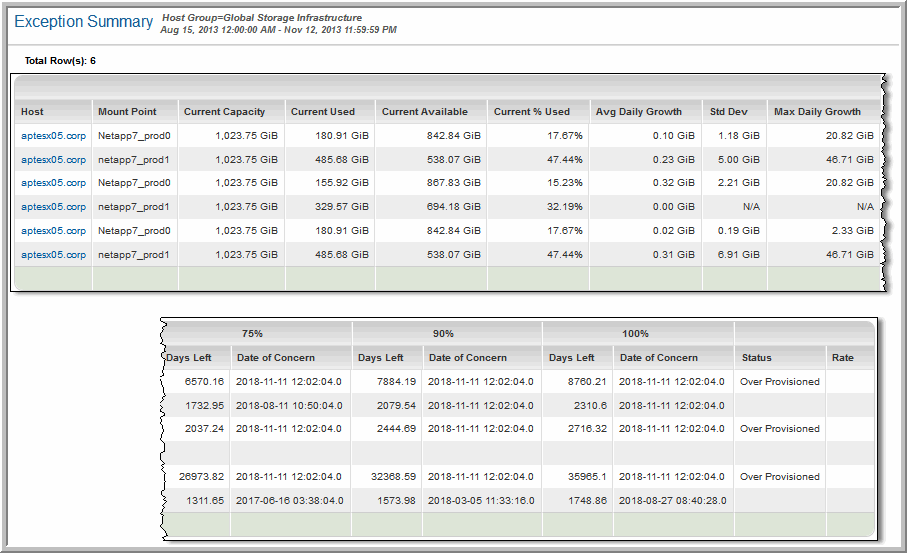Exception Summary
Use Search to find a template, report or dashboard by name. Search is case insensitive, supports partial entries, and will display a list of potential matches.
As you enter the name in the Search field, up to 10 potential matches are displayed. If the template, report or dashboard is shown, you can select and run it directly from the match list. You can also click All Items in the match list to go directly to the Search Results.
StorageConsole provides different navigation options to slice and examine your collected data. You can explore the data by using the APTARE customizable report templates or by using parts of your IT infrastructure as entry points. The Inventory Navigator serves as a browser for your infrastructure by object type. See also
Exploring Your Inventory.
Use the Reports tab to examine the StorageConsole catalog of templates, dashboards and reports - organized by products along with user-created, and system folders. This report is located here:
Capacity Manager > Capacity at Risk > Exception Summary
This report provides a list of filesystem mount points that may require attention for one of the following reasons:
• Near Capacity: > 90%
• Over-Provisioned: < 30%
• Empty: < 5% (negative Rate)
• Fast-Growing: > .9%
NOTE: To provide a realistic forecast, the time span for determining when capacity may be at risk has been limited to five years.
Advanced Options
In the scope selector, click Advanced to override the default parameters shown above:
These Advanced Options are used to determine capacity exceptions, such as near capacity and over-provisioned.

Exception Summary Report Details
Host | Host name links to the Host Utilization Detail report. |
Mount Point | The mount point. |
Current Capacity | Total capacity of the mount point. |
Current Used | Current allocated storage in mount point. |
Current Available | Current Capacity - Current Used. |
Current % Used | Current Used / Current Capacity. |
Avg Daily Growth | (sum (used - prev used))/total number of days in the time interval); If the Avg Daily Growth is less than 0, the Days Left and Date of Concern columns will not be populated. |
Std Dev | Standard Deviation for the Avg Daily Growth. |
Max Daily Growth | Maximum daily growth from the selected period of time. Provides an indication of the average validity. Growth must be at least 1 MB to be considered. |
75% - Days Left | ((.75 * Current Capacity/Avg Daily Growth). |
75% - Date of Concern | Date of the report + Days Left. |
90% - Days Left | ((.9 * Current Capacity/Avg Daily Growth). |
90% - Date of Concern | Date of the report + Days Left. |
100% - Days Left | Current Capacity/Avg Daily Growth. |
100% - Date of Concern | Date of the report + Days Left. |
Status | Near Capacity if Current % Used > specified criteria; Over-Provisioned if Current % Used < specified criteria; Out of Space if Current Available < Avg Daily Growth; Empty if Current % Used < 5%. |
Rate | Growth rate. Fast-growing if Avg Daily Growth/Current Capacity > specified criteria; Negative if Avg Daily Growth < .05. |


 Exception Summary Report Details
Exception Summary Report Details